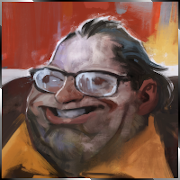|
Autism Sneaks posted:His daughter Erica just died this year too Yeah, that’s a loving tragedy.
|
|
|
|

|
| # ? Apr 30, 2024 08:44 |
|
MonsieurChoc posted:Finished the Eric Garner book. It somehow got me to empathize with the police as they are being solely blamed for enforcing a system decided by politicians voted in by lovely white people. Lock up bill Clinton
|
|
|
|
I preordered "Fire and Fury" by Michael Wolff because I'm unhealthily obsessed with this gently caress lagoon of a presidency. It's probably going to be a waste of $15 but I have poor impulse control.
|
|
|
|
|
whomupclicklike posted:I preordered "Fire and Fury" by Michael Wolff because I'm unhealthily obsessed with this gently caress lagoon of a presidency. It's probably going to be a waste of $15 but I have poor impulse control. It's gonna rule
|
|
|
|
Just finished The Greatship and it ruled. The ending stories are considerably less of an exploration of the ship and more of the universe, but not the worse for it. I don't think I'll remember any of them with as much fondness as I do Alone and Mere, but I highly recommend the book to any hard sci-fi or nerds who like stuff on grand, highly creative scales
|
|
|
|
Just started reading Lucifers Hammer. No real reason other than I like Sci-fi, seen it on a bunch of lists and it was super cheap at the bookstore. Any of you guys read it? Yea? Nay?
|
|
|
TheDon01 posted:Just started reading Lucifers Hammer. No real reason other than I like Sci-fi, seen it on a bunch of lists and it was super cheap at the bookstore. what's it about i like satan and I also like sci fi
|
|
|
|
|
its about a near-apocalyptic asteroid hit on earth; iirc wasnt it written by slightly nuts libertarians?
|
|
|
|
i got a copy of blood on the shores, a book based on the memoirs of viktor leonov who was a twice hero of the soviet union during ww2. been out of print for years dude did naval commando poo poo from norway to korea should be neat
|
|
|
|
I finally finished The Divide gently caress that book and gently caress this country. America is immoral I'm going to read fiction for the next month or so. Starting with Steven Saylor's A Murder on the Appian Way, historical murder mystery about the death of Publius Clodius Pulcher, right during the Republic collapse
|
|
|
|
|
TheDon01 posted:Just started reading Lucifers Hammer. No real reason other than I like Sci-fi, seen it on a bunch of lists and it was super cheap at the bookstore. Haven't read it but the authors are notorious right-wing cranks and based on second hand summaries the plot is all about how sensible and patriotic white guys from suburban California have to band together in the apocalypse to preserve a rational society. That means organizing to violently resist the (literally cannibalistic) black looters streaming out of the nearby inner cities. Along the way we get plenty of helpful lessons on the evils of feminism, environmentalism and welfare.
|
|
|
|
Helsing posted:Haven't read it but the authors are notorious right-wing cranks and based on second hand summaries the plot is all about how sensible and patriotic white guys from suburban California have to band together in the apocalypse to preserve a rational society. That means organizing to violently resist the (literally cannibalistic) black looters streaming out of the nearby inner cities. Along the way we get plenty of helpful lessons on the evils of feminism, environmentalism and welfare. God dammit I was afraid of this. The first chapter was basicly a bunch of hollywood billionaires at some rich guy party and one of em is bragging he discovered a comet. I was hoping he'd turn out to be the badguy since his name was Hamner or something Good thing it was only like $1
|
|
|
|
SKULL.GIF posted:I finally finished The Divide clodius was the most nitecrew roman
|
|
|
|
 Read it. "Robin D.G. Kelley, author of [i posted:Hammer and Hoe[/i]"]Akinyele Umoja’s marvelously rich and exhaustive study of Mississippi will radically transform the debate about the role of nonviolence within the civil rights movement, proving that armed self-defense actually saved lives, reduced terrorist attacks on African American communities, and laid the foundation for unparalleled community solidarity. We Will Shoot Back is decidedly not a romantic celebration of gun culture, but a sometimes sobering, sometimes beautiful story of self-reliance and self-determination and a people’s capacity to sustain a movement against all odds." Pivotal reading for exploring how diverse tactics intersect in the struggle for power & justice
|
|
|
|
next on my list 1) Blood in the water : the Attica prison uprising of 1971 and its legacy by Heather Ann Thompson 2) Red globalization : the political economy of the Soviet Cold War from Stalin to Khrushchev by Oscar Sanchez-Sibony 3) Shadow Cold War : the Sino-Soviet competition for the Third World by Jeremy Friedman then ill try to binge on fiction lol
|
|
|
GalacticAcid posted:
I read a different book about this: This Nonviolent Stuff'll Get You Killed by Charles Cobb. More of an overview of the movement than just in one state, though. I'd recommend it.
|
|
|
|
|
whomupclicklike posted:I read a different book about this: This Nonviolent Stuff'll Get You Killed by Charles Cobb. More of an overview of the movement than just in one state, though. I'd recommend it. Interesting, thanks - Cobb appears at several points in We Will Shoot Back.
|
|
|
|
just finished Red Son and omg it rules
|
|
|
|
Has anybody read Jackson Rising yet? I intend on picking it up as soon as I get through my current library stack. Someone in another thread directed me to this excellent Oxford American essay on the same subject - The Socialist Experiment: a new-society vision in Jackson, Mississippi.
|
|
|
|
The New Jim Crow posted:Imagine you are Emma Faye Stewart, a thirty-year-old, single African American mother of two who was arrested as part of a drug sweep in Hearne, Texas. All but one of the people arrested were African American. You are innocent. After a week in jail, you have no one to care for your two small children and are eager to get home. Your court-appointed attorney urges you to plead guilty to a drug distribution charge, saying the prosecutor has offered probation. You refuse, steadfastly proclaiming your innocence. Finally, after almost a month in jail, you decide to plead guilty so you can return home to your children. Unwilling to risk a trial and years of imprisonment, you are sentenced to ten years probation and ordered to pay $1,000 in fines, as well as court and probation costs. You are also now branded a drug felon. You are no longer eligible for food stamps; you may be discriminated against in employment; you cannot vote for at least twelve years; and you are about to be evicted from public housing. Once homeless, your children will be taken from you and put in foster care. Folks... this America place... not so good.
|
|
|
|
a book so good they're banning it from prisons https://twitter.com/ShaunKing/status/950338320193769472 nobody will care because prisoners don't have any civil rights lol
|
|
|
|
I put down Lucifers Hammer for now because I found a copy of The Forever War by Haldeman. Im about 2/3 the way through it now but it is so good. Space weed, bunkin battle buddies and (future) earth sucks.
|
|
|
|
TheDon01 posted:I put down Lucifers Hammer for now because I found a copy of The Forever War by Haldeman. Forever War loving rules, especially the fully automated gay luxury communism bit never read Lucifer's Hammer but it sounds pretty bad, you made a good call in switching up If you like Forever War check out Return from the Stars next, it also deals with culture shock from time dilation but it's all post-war, and also Stanislaw Lem is a gem of a writer who doesn't get enough love
|
|
|
|
And the very last excerpt I'll post from The Divide before I delete this cursed file from my Kindle. I won't bold anything. Read it through if you're white. Matt Taibbi, the Divide posted:On the morning of March 23, 2011, a young white saxophonist and music teacher named Patrick Jewell woke up in Brooklyn in a good mood. Matt Taibbi, the Divide posted:There are thousands of other things at work here, but the last straw in every great social tragedy is always something absurd like this, like the nation’s top law enforcement officials unable to spot the greatest crime wave of a generation, because they can’t see the victims from their offices.
|
|
|
|
|
Epic High Five posted:Forever War loving rules, especially the fully automated gay luxury communism bit The only Lem I've read was Solaris. It was good, but slow and not an action packed book at all. Does he have any other notable scifi books? I also picked up Echopraxia and have The Divide on order from the local bookstore. Ill be reading one of those two next. Depends on how quick it arrives. TheDon01 has issued a correction as of 18:52 on Jan 8, 2018 |
|
|
|
TheDon01 posted:The only Lem I've read was Solaris. It was good, but slow and not an action packed book at all. Does he have any other notable scifi books? I haven't read terribly much of his yet, but what I've read has been more contemplative than action packed, though the "it's all talking" doesn't approach Asimovian levels or anything. There's also the first half of Starship Troopers, which is a fun read as long as you stop when he gets to Officer School
|
|
|
|
This book doesn't have enough explosions!
|
|
|
|
This is a good thread.
|
|
|
|
Every excerpt from The Divide that I'm seeing posted here seems really good and I'm tempted to buy the book. However, I'm not a huge fan of long-form journalism that leans too heavily on first person narration. In the past I've struggled to get into Taibbi's writing because so many of the sentences start with "I", "I went here, I saw this, I did that, I spoke to X, I spoke to Y" etc. Can anyone comment on how The Divide is written? If I opened a copy of the book and flipped to a random page how likely would it be that the first thing I'd read would be a paragraph started with "I"?
|
|
|
|
Helsing posted:Every excerpt from The Divide that I'm seeing posted here seems really good and I'm tempted to buy the book. However, I'm not a huge fan of long-form journalism that leans too heavily on first person narration. In the past I've struggled to get into Taibbi's writing because so many of the sentences start with "I", "I went here, I saw this, I did that, I spoke to X, I spoke to Y" etc. Can anyone comment on how The Divide is written? If I opened a copy of the book and flipped to a random page how likely would it be that the first thing I'd read would be a paragraph started with "I"? He does describe his impressions of visiting Rikers or sitting in a courtroom, but it's much less "I" focused than most of his articles, I'd say.
|
|
|
Helsing posted:Every excerpt from The Divide that I'm seeing posted here seems really good and I'm tempted to buy the book. However, I'm not a huge fan of long-form journalism that leans too heavily on first person narration. In the past I've struggled to get into Taibbi's writing because so many of the sentences start with "I", "I went here, I saw this, I did that, I spoke to X, I spoke to Y" etc. Can anyone comment on how The Divide is written? If I opened a copy of the book and flipped to a random page how likely would it be that the first thing I'd read would be a paragraph started with "I"? Taibbi does use it but primarily as a transition tool. I can think of 3-4 instances in the book where he uses it to transition away from a chapter into the next topic. The biggest part is when he goes to a courthouse to see how the sausage is made, and that's about.. 30 or 40 pages or so? Hard to estimate page count on the Kindle. Most of the book is him conveying experiences from people who've been screwed by the system, like Patrick Jewell above or the deported people from earlier in the thread, or writing about financial crimes (in the third person). For what it's worth, I'm kind of picky about my writers. Taibbi's writing isn't great but it's unobstructive and lets me focus on the content of what he's writing about.
|
|
|
|
|
TheDon01 posted:The only Lem I've read was Solaris. It was good, but slow and not an action packed book at all. Does he have any other notable scifi books? Lem is pretty awesome. I really like all of his "Tales of Pilot Pirx" (space opera, but very well done), and "The Futurolgical Congress" (amusing farce about mind control drugs). Also, Philip K Dick thought that Lem wasn't a real person, and his works were actually written by a secret committee of communist writers to propagandize americans. He went so far as to share this with the FBI.
|
|
|
|
GoluboiOgon posted:Lem is pretty awesome. I really like all of his "Tales of Pilot Pirx" (space opera, but very well done), and "The Futurolgical Congress" (amusing farce about mind control drugs). The Cyberiad is very good.
|
|
|
sonatinas posted:The Cyberiad is very good. it is, but as I was reading it I had to wonder how much of it came from the mind of the translator and how much was true to the Polish language text. it's just so full of wordplay and puns and I can't imagine how difficult it must have been to stay true to the original work.
|
|
|
|
|
In the chapter about prosecutorial discretion, and how it's basically unreviewable:The New Jim Crow posted:The risk that prosecutorial discretion will be racially biased is especially acute in the drug enforcement context, where virtually identical behavior is susceptible to a wide variety of interpretations and responses and the media imagery and political discourse has been so thoroughly racialized. Whether a kid is perceived as a dangerous drug-dealing thug or instead is viewed as a good kid who was merely experimenting with drugs and selling to a few of his friends has to do with the ways in which information about illegal drug activity is processed and interpreted, in a social climate in which drug dealing is racially defined. As a former U.S. Attorney explained: That's a lmao
|
|
|
|
L M A O, chapter on all white juriesThe New Jim Crow posted:the prosecutor offered the following explanation to justify his strikes of black jurors:
|
|
|
|
I love Stalker but I still haven't read Roadside Picnic (the source material). Do you think I should read Roadside Picnic before or after Zona by Geoff Dyer, his book about Stalker? (If you've never read his work, he tends to take a subject and write discursive but connected essays surrounding that subject. For instance, The Missing of the Somme is about the ways WWI is memorialized and includes ruminations on public architecture, statue design, modern art, ceremonial traditions, etc. It's a lovely work and short enough to read on a moderate inter-city plane or train ride.)
|
|
|
|
Echpraxia was p good Onto Bill, the Galactic Hero
|
|
|
|
Though more likely, I will be finishing up The Rediscovery of Man, the book honkin 700 page version not the slim version for CUCKS
|
|
|
|

|
| # ? Apr 30, 2024 08:44 |
|
remembered i had a paperwhite from like 5 years ago, and found it, hell yeah babyyyyyy
|
|
|





























